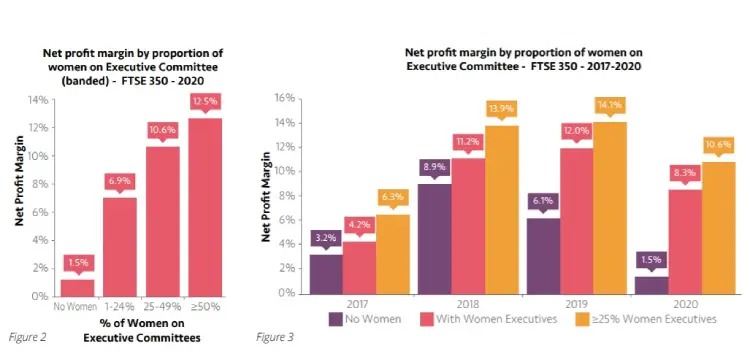
FTSE companies with no women at the board level are 10 times less profitable than those whose executive boards have women holding a third of positions.
That’s according to a report released today by Diversity and Inclusion organisation The Pipeline, in a report that drives home how much work there remains to do to secure even rudimentary levels of gender diversity across UK business — and crucially, the extent to which it is in the interests of profit to ensure such diversity.
“The UK economy and shareholders have missed out on an additional £47 billion in pre-tax profit”, report authors Margaret McDonagh and Lorna Fitzsimons noted, in their fifth annual report tracking the number of women on executive committees and main boards in FTSE 350 companies. (The two are Pipeline’s founders).
“This is how much money could have been gained if the companies with no women on their executive committees this year had performed with the same net profit margin as companies with more than 33% female membership on their executive committees.”
<< Enter Your Strong Women Leaders in Computer Business Review’s New Technology Leaders Index: Applications Close July 31, 2020 >>
Among its other startling findings: there were more CEOs called “Peter” than their were women CEOs in the FTSE 100 until July 2020 (six, versus five). The numbers are now level, after Amanda Blanc’s appointment as CEO at AVIVA on 6th July 2020).
According to the report: “There remains a woeful lack of women Chief Executive Officers (CEOs) in the FTSE 350. Last year, Women Count 2019 revealed how there were only 13 female CEOs in the FTSE 350, and it was hoped that things would improve from this very low base.”
Read This: Five Questions with… Liza Russell, CEO of Inbotiqa
However, the situation remains abysmal, with 13 women still leading FTSE 350 companies (at the time of data collection). This represents a mere 5% of FTSE 350 company leaders”

There are also barely any female Chief Financial Officers (CFO): Just 16% of the FTSE 350 have a woman as a CFO. Other central employee roles such as Investment managers yield similar statistics, with just 4% of women winning that job title.
How do Women Feel About This?
Women polled by the company GENIE have expressed the unfairness in the lack of diversity higher up in the organisations they work in. When asked whether they can see people who have the same background as them at the top of an organisation, 50 percent of women disagreed, as did 75% of black colleagues. This is in direct comparison with 36 percent of men expressing the same consternation.
The report continued:
In the FTSE 100, the situation has worsened. In 2020 (at the date of data collection – 17th April 2020) there are currently 5 female CEOs in the FTSE 100.
“It is hard to believe that things could get worse than 2019, when there were just 6 female CEOs in the FTSE 100, but 2020 sees another backward step.
“If maintained, this rate of regression will result in there being no women CEOs in the FTSE 100 by 2025. A depressing thought”.
“This census should be a huge wake-up call for corporate Britain, especially as emerging evidence is showing that organisations and governments headed by women are faring better during the Covid-19 crisis”, its authors concluded.






